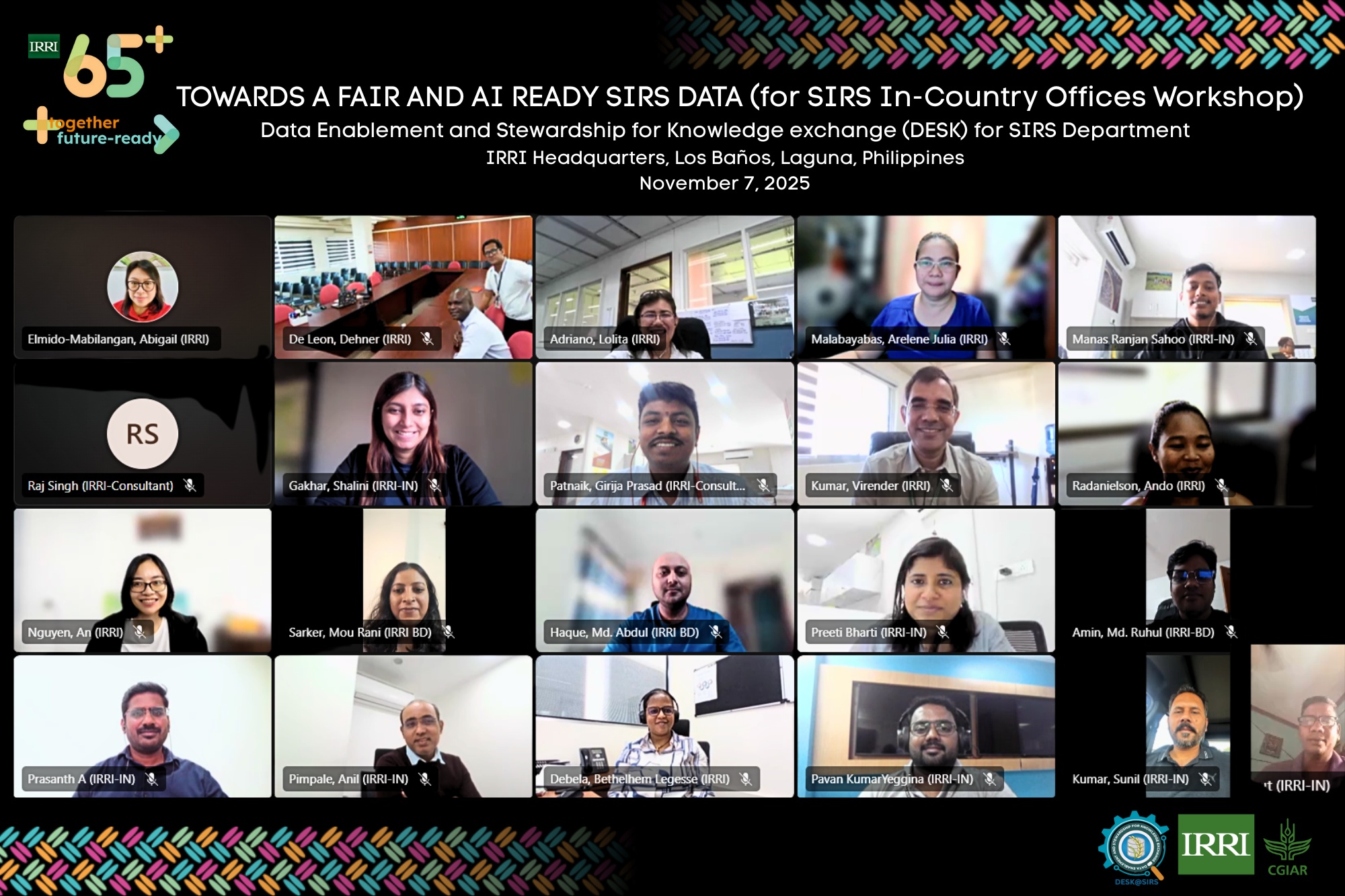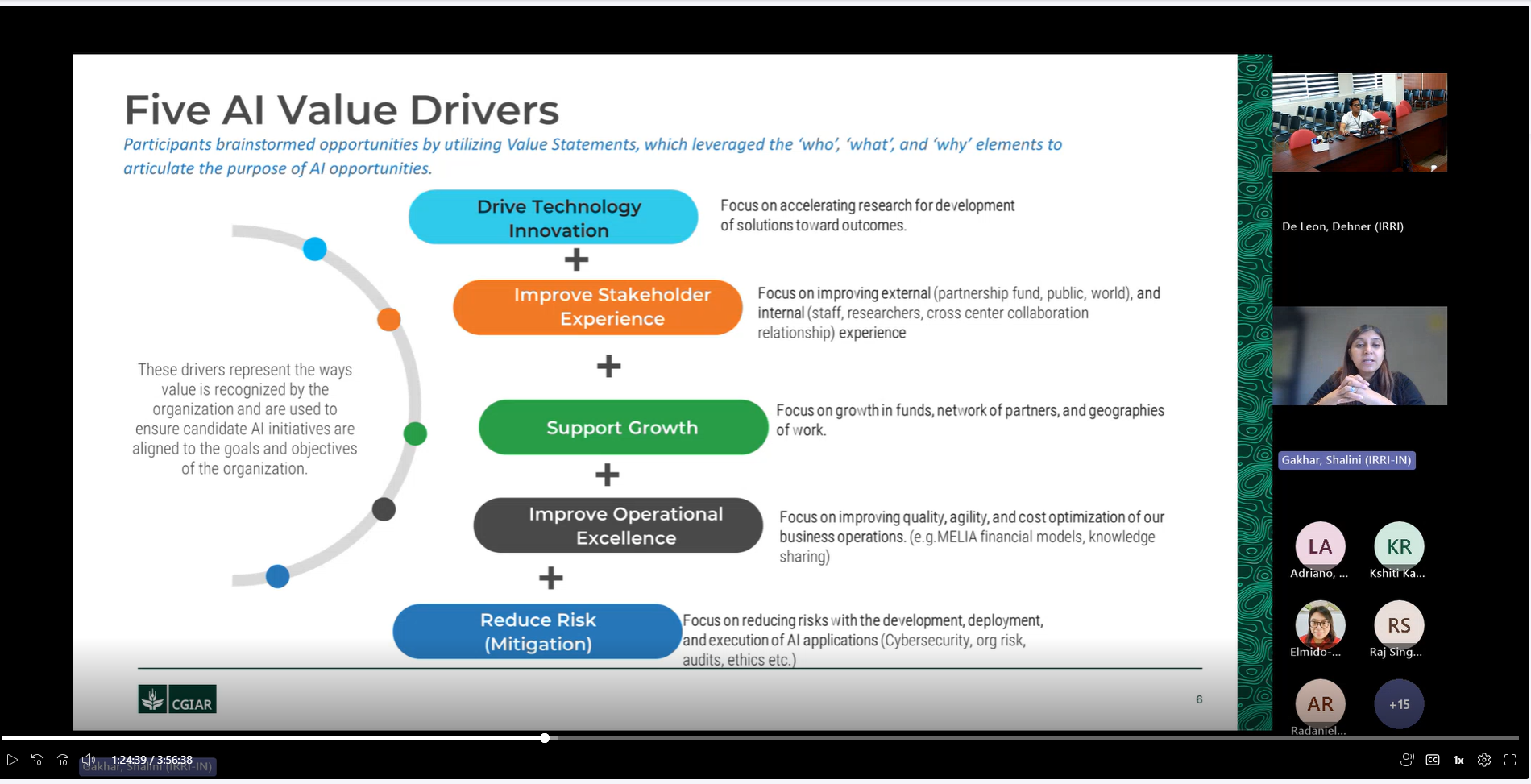Towards a FAIR and AI-Ready SIRS Data: Building the Foundations for Digital Transformation

LOS BAÑOS, Philippines (07 November 2025) — As part of its commitment to promote and integrate best data management practices, the Sustainable Impact through Rice-based Systems (SIRS) Department at IRRI held a workshop for IRRI Country Offices to introduce the Data Enablement and Stewardship for Knowledge Exchange (DESK) work and strengthen data integration across research themes. Discussions focused on making agricultural research data Findable, Accessible, Interoperable, and Reusable (FAIR) to strengthen institutional data ecosystems and make them future- and AI-ready. The workshop brought together data champions and staff from Kenya, India, Bangladesh, Vietnam, Cambodia, and the Philippines. Participants represented diverse thematic areas, including agronomy, gender, climate, and Monitoring, Evaluation & Learning (MEL), highlighting the cross-disciplinary nature of IRRI’s data ecosystem.
SIRS Research Director Dr. Virender Kumar elaborated on the DESK Committee’s objective to improve institutional collaboration through data sharing and management, emphasizing the importance of treating data as a strategic institutional asset, not merely as a byproduct of research. Reflecting on the initiative that began back in November 2023 with several workshops organised in the Philippines, Dr. Kumar highlighted the need to integrate field data, GIS resources, and big data analytics to address pressing global challenges.

Strengthening the Data Ecosystem and Governance
IRRI Senior Scientist for Environment and Climate Change Dr. Ando Mariot Radanielson identified the persistent challenges in data management such as the lack of standardized guidelines, absence of a reference architecture, and confusion between metadata and metafiles. Then, she elaborated on the vision behind the DESK initiative which aligns with the Area of Work (AoW) 1: Data Ecosystem of the CGIAR Digital Transformation Accelerator (DTA) which is “To create a robust data ecosystem enabling shared, FAIR (Findable, Accessible, Interoperable, and Reusable), Artificial Intelligence-ready agricultural research for development (AR4D) data”. Dr. Radanielson advocated for the creation of a community of practice to support the Institute in ensuring the adoption and implementation of the best data management practices. She also stressed the importance of consistency in data sharing, both externally and internally, noting that these practices will directly inform the IRRI’s upcoming Digital Strategy.
Preparing for AI Readiness and FAIR Implementation
IRRI Data Scientist Dr. Shalini Gakhar discussed AI readiness and FAIR data principles. Dr. Gakhar noted that an AI divide already exists in the global research community. Bridging this divide requires that institutional data is not only FAIR but also AI-ready, structured, high-quality, and machine-interpretable. She stated that FAIR data is the foundation of equitable digital innovations.
From Principles to Practice: Mapping and FAIR Scoring
Participants engaged in Mapping of Datasets and FAIR Scoring Exercises, assessing the readiness and compliance of their datasets with FAIR principles. IRRI Database Management Specialist
IRRI Specialist Dehner M. De Leon introduced tools and resources such as the IRRI Farm Household Survey Database, DESK web platform, CC Chooser, Dataverse, Copilot, and Cross lateral for FAIR scoring. He discussed cross-cutting data interoperability cases where agronomy and breeding systems converge, such as the Global Market Intelligence Platform (GloMIP) and the Reducing Methane Emissions from Rice (REMET-Rice) research project. Dehner also mentioned that there are ongoing efforts toward data harmonization, particularly the development of least common variables for survey data to promote standardization across projects.
Looking Ahead
The team outlined plans for an in-person workshop next year, building on the seven trainings and two CGIAR-level workshops already conducted.
The workshop concluded with a shared vision: to make IRRI’s data ecosystem not only FAIR but also future-proof and AI-empowered. By embedding robust data governance and promoting collaboration across disciplines and countries, IRRI continues to pave the way for a digital transformation that supports evidence-based, data-driven agricultural innovation.